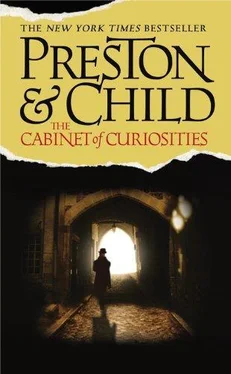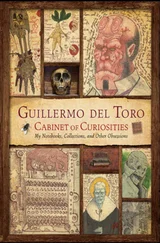Douglas Preston - The Cabinet of Curiosities
Здесь есть возможность читать онлайн «Douglas Preston - The Cabinet of Curiosities» весь текст электронной книги совершенно бесплатно (целиком полную версию без сокращений). В некоторых случаях можно слушать аудио, скачать через торрент в формате fb2 и присутствует краткое содержание. Жанр: Триллер, на английском языке. Описание произведения, (предисловие) а так же отзывы посетителей доступны на портале библиотеки ЛибКат.
- Название:The Cabinet of Curiosities
- Автор:
- Жанр:
- Год:неизвестен
- ISBN:нет данных
- Рейтинг книги:3 / 5. Голосов: 1
-
Избранное:Добавить в избранное
- Отзывы:
-
Ваша оценка:
- 60
- 1
- 2
- 3
- 4
- 5
The Cabinet of Curiosities: краткое содержание, описание и аннотация
Предлагаем к чтению аннотацию, описание, краткое содержание или предисловие (зависит от того, что написал сам автор книги «The Cabinet of Curiosities»). Если вы не нашли необходимую информацию о книге — напишите в комментариях, мы постараемся отыскать её.
The Cabinet of Curiosities — читать онлайн бесплатно полную книгу (весь текст) целиком
Ниже представлен текст книги, разбитый по страницам. Система сохранения места последней прочитанной страницы, позволяет с удобством читать онлайн бесплатно книгу «The Cabinet of Curiosities», без необходимости каждый раз заново искать на чём Вы остановились. Поставьте закладку, и сможете в любой момент перейти на страницу, на которой закончили чтение.
Интервал:
Закладка:
Pendergast’s trail led out of the cabinets and through another arched doorway. The Surgeon followed, gun at the ready. Beyond lay what looked like a series of smaller rooms — closer to individual stone crypts or vaults, actually — each containing a collection of some kind. Pendergast’s trail weaved back and forth between them. More oaken cabinets, filled with what looked like bark and leaves and dried flowers. He stopped a moment, staring around curiously.
Then he reminded himself that Pendergast was the pressing issue. Judging from the weaving tracks, the man was now having trouble walking.
Of course, knowing Pendergast, it could be a ruse. A new suspicion arose within him, and the Surgeon crouched beside the nearest scattering of crimson droplets, touching his fingers to one, rubbing them together. Then he tasted it. No doubt about it: human blood, and still warm. There could be no way of faking that. Pendergast was definitely wounded. Gravely wounded.
He stood up, raised the gun again, and moved stealthily forward, his flashlight probing the velvety darkness ahead.
SIX
NORA STEPPED WARILY through the doorway. After the darkness of the cell, the light was so bright that she shrank back into shadow, temporarily blinded. Then she came forward again.
As her eyes adjusted, objects began to take form. Metal tables, covered with gleaming instruments. An empty gurney. An open door, leading onto a descending staircase of rough-hewn stone. And a figure, strapped facedown onto a stainless steel operating table. Except the table was different from others she had seen. Gutters ran down its sides into a collecting chamber, full now with blood and fluid. It was the kind of table used for an autopsy, not an operation.
The head and torso of the figure, as well as the waist and legs, were covered by pale green sheets. Only the lower back remained exposed. As Nora came forward, she could see a ghastly wound: a red gash almost two feet long. Metal retractors had been set, spreading the edges of the wound apart. She could see the exposed spinal column, pale gray amidst the pinks and reds of exposed flesh. The wound had bled freely, red coagulating tributaries that had flowed down either side of the vertical cut, across the table, and into the metal gutters.
Nora knew, even without drawing back the sheet, that the body was Smithback’s. She suppressed a cry.
She tried to steady herself, remembering what Pendergast had said. There were things that needed to be done. And the first was to verify that Smithback was dead.
She took a step forward, glancing quickly around the operating theater. An IV rack stood beside the table, its clear narrow tube snaking down and disappearing beneath the green sheets. Nearby was a large metal box on wheels, its panel festooned with tubes and dials — probably a ventilator. Several bloody scalpels sat in a metal basin. On a nearby surgical tray were forceps, sterile sponges, a squirt bottle of Betadine solution. Other instruments lay in a scatter on the gurney, where they had apparently been dropped when the surgery was interrupted.
She glanced at the head of the table, at the rack of machines monitoring the vital signs. She recognized an EKG screen, a ghostly line of green tracing a course from left to right. Tracing a heartbeat. My God, she thought suddenly, is it possible Bill’s still alive?
Nora took a rapid step forward, reached over the gaping incision, and lifted the sheet away from his shoulders. Smithback’s features came into view: the familiar tousled hair with the unrepentant cowlick, the skinny arms and shoulders, the curl of hair at the nape of his neck. She reached forward and touched his neck, felt the faint pulse of the carotid artery.
He was alive. But barely.
Had he been drugged? What should she do? How could she save him?
She realized she was hyperventilating, and struggled to slow both her breathing and her thoughts. She scanned the machines, thinking back to the pre-med classes she’d taken in college; to the courses in gross anatomy, biological and forensic anthropology in graduate school; her brief experience as a hospital candy striper.
She quickly moved on to the next machine, trying to frame the overall situation. The machine was clearly a blood pressure monitor. She glanced at the systolic and diastolic readouts: 91 over 60. At least he had pressure as well as pulse. But it seemed low, too low. Beside it was another machine, connected to a line leading to a clip on Smithback’s index finger. Nora’s uncle had worn one of these when he’d been in the hospital a year before, suffering from congestive heart failure: it was a pulse-oximeter. It shone a light upon the fingernail, and measured the oxygen saturation of the blood. The readout was 80. Could that be right? She seemed to recall that anything less than 95 was cause for concern.
Nora looked back now at the EKG machine, at the pulse readout in its lower right corner. It stood at 125.
Abruptly, the blood pressure meter began bleating a warning.
She knelt toward Smithback, listening to his breathing. It was rapid and shallow, barely audible.
She straightened, gazing around at the machines with a moan of despair. God, she had to do something. She couldn’t move him; that would mean certain death. Whatever she did, she would have to do it here and now. If she couldn’t help him, Smithback would die.
She fought to control her panic, struggled with her memory. What did this all mean: low blood pressure; abnormally fast heart rate; low blood oxygen?
Exsanguination. She looked at the appalling pool of blood in the collecting basin at the bottom of the table. Smithback was suffering from massive blood loss.
How did the body react in such cases? She thought back to the distant lectures she’d only half paid attention to. First, by tachycardia, as the heart beat faster in an attempt to profuse the tissues with oxygen. Next, by — what was the damn term? — vasospasm. She quickly stretched out a hand, felt Smithback’s fingers. As she expected, they were ice cold, the skin mottled. The body had shut down blood to the extremities to maximize oxygen in the critical areas.
The blood pressure would be the last to go. And Smithback’s was already dropping. After that…
She did not want to think about what would happen after that.
A wave of sickness passed over her. This was insane. She wasn’t a doctor. Anything she did could easily make things worse.
She took a deep breath, staring at the raw wound, forcing herself to concentrate. Even if she knew how, closing and suturing the incision would not help: the blood loss was already too great. There was no plasma around for a blood transfusion, and had there been any, administering a transfusion was beyond her abilities.
But she knew that patients who had lost a lot of blood could be rehydrated with crystalloids or a saline solution.
She looked again at the IV rack beside the table. A thousand-cc bag of saline solution hung from it, tube drooping down from the metal stand and into the vein in Smithback’s wrist. The stopcock had been shut off. A hypodermic syringe, half empty, dangled near the bottom, its needle inserted into the tube. She realized what it was: a local monitored anaesthetic, probably Versed, given as a drip because Versed doesn’t last much more than five minutes. It would keep the victim conscious, but reduce any resistance, perhaps. Why hadn’t the Surgeon used general, or spinal, anesthesia for the procedure?
It didn’t matter. The point was to replace Smithback’s fluids as quickly as possible, get his blood pressure up — and here were the means to do it.
She plucked the hypodermic from the IV tube and threw it across the room. Then, reaching for the stopcock at the base of the liter bag of saline, she turned it clockwise as far as it would go.
Читать дальшеИнтервал:
Закладка:
Похожие книги на «The Cabinet of Curiosities»
Представляем Вашему вниманию похожие книги на «The Cabinet of Curiosities» списком для выбора. Мы отобрали схожую по названию и смыслу литературу в надежде предоставить читателям больше вариантов отыскать новые, интересные, ещё непрочитанные произведения.
Обсуждение, отзывы о книге «The Cabinet of Curiosities» и просто собственные мнения читателей. Оставьте ваши комментарии, напишите, что Вы думаете о произведении, его смысле или главных героях. Укажите что конкретно понравилось, а что нет, и почему Вы так считаете.










